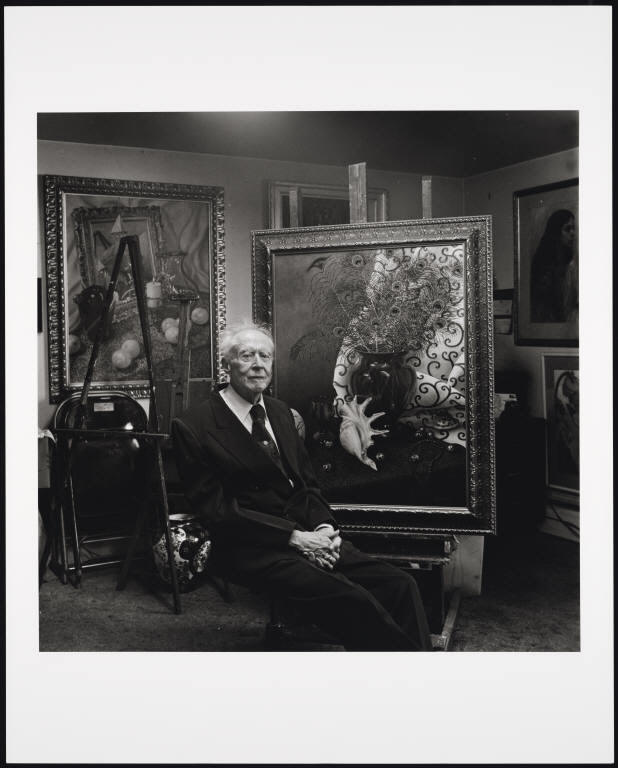Queer Places:
University of Denver, 2199 S University Blvd, Denver, CO 80208
1315 Columbine St, Denver, CO 80206
 Elver
Barker aka Carl B. Harding was and artist, teacher, gay and human rights
activist who was one of the early officers of the Mattachine Society and an
editor of the Mattachine Review.
Elver
Barker aka Carl B. Harding was and artist, teacher, gay and human rights
activist who was one of the early officers of the Mattachine Society and an
editor of the Mattachine Review.
Elver Amos Barker was born in
Newcastle, WY in 1920. Being a specialist in organizing, he had been a
social-change activist since 1942 in the non-violence movements for a warless
world of brotherhood and justice for all. He was also active in the Rocky
Mountain Skeptics for a rational alternative to the pseudo-sciences.
His AB in Education was from the University of Denver. His major art training
in representational oils and pastels was under the late Arthur W. Palmer and
Thomas Leighton in San Francisco. He had also attended workshops taught by
Daniel E. Greene, Ben Konis, Mel Fillerup, and the late Merlin Enabnit and
George Cherepov.
While he painted a wide variety of subjects, one of
his specialties was still lifes... the beauty in simple things. Through
extensive experimentation he developed finger painting in transparent oils, in
which, as many effects are achieved by the removal of colors as by their
application, leaving the color of the support showing through. His book
Finger painting in oils was published by D. Van Nostrand in 1968. The
artist's specialty in this unique technique was gnarled trees, especially
Bristlecone Pines at timberline which he photographed and used as models.
Natural woodgrain patterns were produced by the whorls on the thumb. After 30
years of further experimenting, he was working on a revised edition, Finger
Painting in Transparent Non-toxic Oils.

Photo by
Robert Giard, Rights Notice: Copyright Jonathan G. Silin (jsilin@optonline.net)
The artist had also developed
feather painting in transparent oils... abstract expressionism symbolizing the
sounds of music. Some of these were rhythm paintings... done after and while
listening to music. After publication of his book, Elver was interviewed on
channel 9 (in Denver). The photographer focused on several of his oil finger
and feather paintings while he described them. That weekend May-D&F had a
large display of his finger works in the window for two days. During that time
he demonstrated the technique in the book department and autographed sold
copies of his book. He was also interviewed by the late Bill Barker and Mrs.
Barker on KOA radio (in Denver).
"Today's Art" devoted five pages to his well-illustrated article: Finger
painting in Transparent Oils". The artist had had 39 years experience in
teaching drawing and featherpainting in transparent oils in Wyoming, South
Dakota and Colorado. He had given lecture demonstrations and workshops on his
finger and feather painting in these states and also in Nebraska and Kansas.
One of his oil finger paintings "Christmas at Timberline" was published on a
Christmas card by the former Lazy BL ranch publishers in Cheyenne.
Just
before Christmas 1982, the people in all of his classes surprised him by
converging on his studio during class and presented him with a check to go to
Hawaii to photograph flowers, something he had long wanted to do. Two
representatives from Channel 2 News were there. He went to Hawaii in late
March, after the rainy season, visited three islands for three weeks, and took
over 300 photographs of flowers from which he and his students are still
painting. He liked to greatly enlarge flowers for their decorative value,
having been inspired to do this after seeing the work of Georgia O'Keefe.
Elver was rated qualified by a jury of the Rotary Club to submit each
year, Three slides of his paintings for consideration as entries in the annual
Artists of America exhibit sponsored by the Rotary Club and the Colorado
Historical Society. Most of the exhibitors were big name artists, but the work
of a few lesser-known artists had been selected each year. Because of the
large number of lesser-known artists competing, he never achieved this goal.
In 1953, he lost his job at the Alameda County welfare office when a
supervisor figured out that Barker was gay. He then became among the most
active members of the Mattachine Society. Out of fear for losing his job as a
schoolteacher for being a gay activist, he operated under the name Carl B.
Harding, which he signed to articles he wrote, letters to the editor of local
newspapers and when quoted in newspaper reports. "We were afraid we'd lose our
jobs," Barker recall to Westword on the occassion of the 1999 Gay Pride
Parade. "I loved my work," Barker said of one lost job. "But one day, my
supervisor said to me, 'We all live in glass houses around here.' And when he
said that, I knew I was being discriminated against."
Barker also
edited the Mattachine Education Handbook, “a resource dedicated to fighting
discriminatory policies such as a standard practice that law enforcement
agencies used to illegally entrap gays.”
In 1956, Elver moved to Denver
to become a teacher and established a local Mattachine Society. His role with
the Mattachine is documented in the book Behind the Mask of the Mattachine to
be released in the Fall of 2006. His correspondence as a Mattachine Officer is
preserved in the New York Public Library.
My published books:


BACK TO HOME PAGE

-
http://www.tyleralpern.com/ElverBarker.html
 Elver
Barker aka Carl B. Harding was and artist, teacher, gay and human rights
activist who was one of the early officers of the Mattachine Society and an
editor of the Mattachine Review.
Elver
Barker aka Carl B. Harding was and artist, teacher, gay and human rights
activist who was one of the early officers of the Mattachine Society and an
editor of the Mattachine Review.

